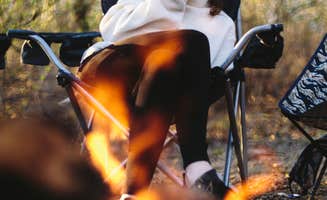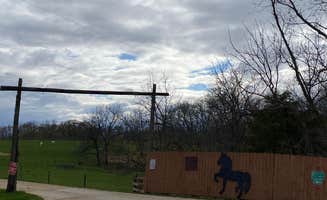Equestrian camping near Orangeville, Illinois offers numerous options for riders seeking trails through diverse terrain. The region contains several forest preserves and state parks within a 40-mile radius, with elevations ranging from 700 to 1,000 feet above sea level. Summer temperatures typically range from 70-85°F with higher humidity, while spring and fall provide cooler temperatures ideal for trail riding.
What to do
Trail riding at Yellowstone Lake State Park: Navigate more than 15 miles of trails through hardwood forests and prairie landscapes. "Average Hiking (more walking in my opinion). The lake is gorgeous though, nice beach too," notes Kristina K. The trails accommodate riders of various skill levels with minimal elevation changes.
Swimming after riding: Lake Le-Aqua-Na State Recreation Area offers a swimming beach for cooling off after trail rides. "We had a lot of fun there playing in the water on the beach," shares Meg K., though she cautions that her son "got a really bad bacterial rash from the water" so swimmers should take precautions.
Wildlife observation: Trails provide opportunities to spot local wildlife. At Yellowstone Lake State Park Campground, visitors report "lots of wildlife to enjoy and Yellowstone. A beautiful park and tons of hiking and nice lake," according to Mallory M. Early morning and dusk offer the best wildlife viewing opportunities.
What campers like
Secluded camping sites: Many equestrian campers appreciate privacy between sites. At Twin Valley Campground in Governor Dodge State Park, "sites are well spaced, though they are all open to each other visually," notes Brian O. This spacing allows horses to rest without disturbances from neighboring campers.
Water access for horses: Seward Bluffs Forest Preserve provides convenient water sources. A reviewer notes it's "a hidden gem of Winnebago County. Beautiful, quite and clean park with hiking trails and horse trails." The preserve maintains multiple water stations accessible to equestrian campers.
Well-maintained facilities: Despite high usage, campground facilities stay clean. "The site was clean and nice with bathrooms close by," reports David Q. from Lake Kegonsa State Park. Regular maintenance ensures comfort for both riders and horses throughout the camping season.
What you should know
Seasonal trail conditions: Trail quality varies by season with some areas becoming muddy after rain. "Rain made trails wet," reports Bill L. from Lake Le-Aqua-Na, adding that despite this, they "enjoyed our site, nice campground."
Reservation requirements: Most equestrian campgrounds require advance booking, especially during peak season. For Rock Cut State Park - Staghorn Campground, a visitor warns that "Peak season reservations are a definite (weeks to months in advance for weekends)."
Varying amenities: Facilities differ between parks. At Seward Bluffs, expect "pit toilets; no shower facilities" according to Bran P., who still found it to be a "quiet. Nice place for solitude. Good hiking trails."
Trail sharing etiquette: Some trails accommodate multiple user types. "The trails are open to everything, and the road apples are impossible to avoid...not a pretty site as mountain bikes do not have fenders," warns Sebastian G. about Lake Le-Aqua-Na State Park.
Tips for camping with families
Choose sites near playgrounds: For families with children, select campgrounds with play areas. At Morrison-Rockwood State Park, "sites 55-64 that loop around the playground" provide convenient access to recreation for children, as noted by Stacie H.
Look for beginner-friendly horse trails: Families with young riders should seek less challenging paths. Morrison-Rockwood offers "a great place for new campers, families of young kids, or just looking for an easier trip," according to Amy W.
Pack for mosquitoes: Bug protection is essential in wooded areas. A Lake Kegonsa visitor warns: "Other reviews tell tales of being eaten alive. We did not see much wildlife so if that is what you're after its best to pick a more remote location."
Tips from RVers
Check site levelness: Many equestrian campgrounds have uneven terrain. At Governor Dodge State Park, Lee D. cautions: "Not all 'driveways' are level which, unfortunately, we discovered in site 33. We slept with our heads lower than our feet in our camper van."
Electrical reliability varies: Older parks may have electrical issues. At Hansen's Hideaway Ranch and Family Campground, RVers appreciate that it "combines camping with an authentic working ranch environment" with "water and electric hookups for RVs along with tent sites, making it suitable for different camping styles while accommodating horses."
Stock up before arrival: Remote equestrian campgrounds often lack nearby supplies. Stuart K. notes about Hansen's Hideaway: "This CG is very remote" and "There is nothing nearby to either stock up on supplies or grab a bite to eat, so when you come here, bring everything with you that you'll need."



